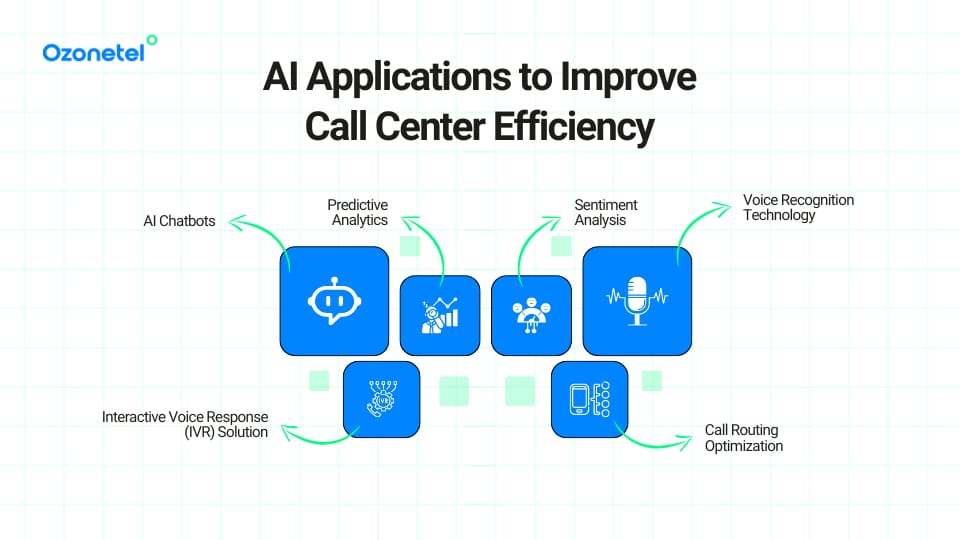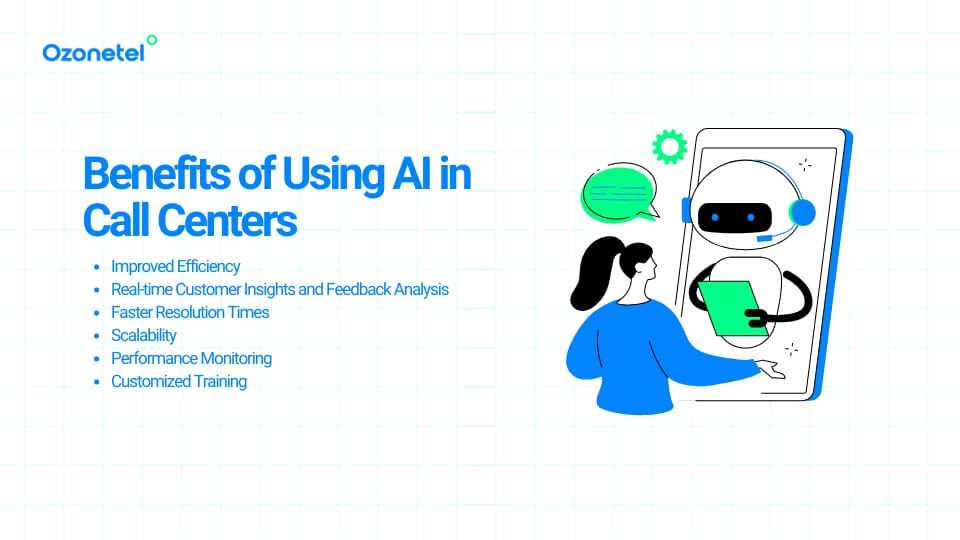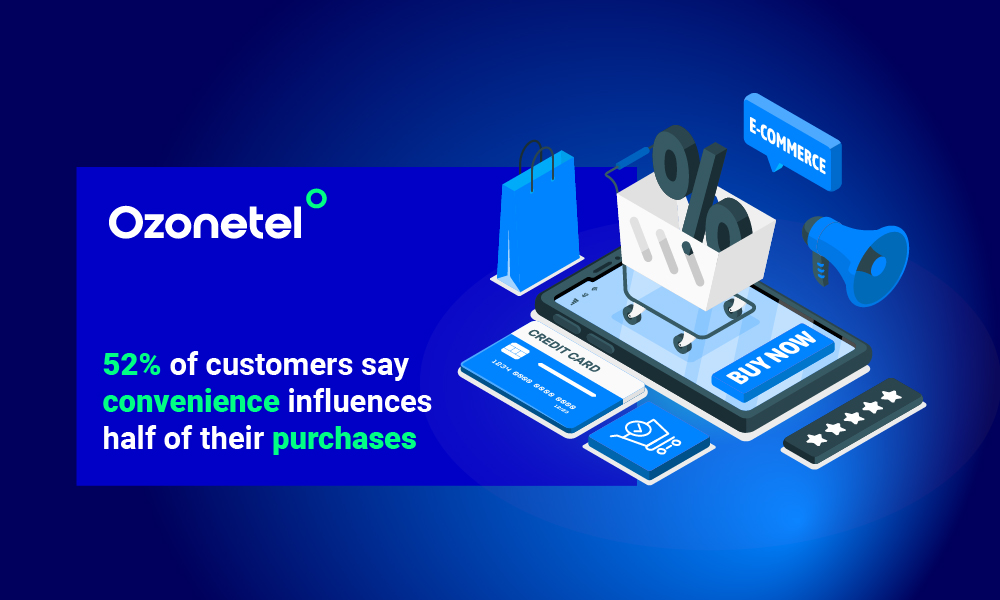- Resources
- AI In Call Centers: How AI Solutions are Reshaping Customer Service in 2024
AI In Call Centers: How AI Solutions are Reshaping Customer Service in 2024

Customer service is no longer a simple box to tick. It is the way for businesses to win or lose customer loyalty. Traditionally, call centers have been famous for long wait times, robotic interactions, and a sense of frustration for both callers and agents. But this narrative is changing. The shift from legacy systems to cloud-based call center solutions has laid the foundation for this evolution, enabling greater flexibility and scalability.
Today, call centers are constantly innovating and leveraging AI technology to streamline processes, enhance agent efficiency, and gain valuable insights to deliver superior experiences to customers at every step of their journey.
In fact, implementing AI in customer service can help businesses reduce costs by up to 30%.
As organizations continue to embrace AI technology, the potential for further innovation and improvement is limitless. Before delving deeper into the capabilities of AI call center software, let us first explore what exactly AI call center software is and how it is reshaping the customer service landscape.
In this article, we will explore:
What is AI Call Center Software?
AI Call Center Software is an advanced solution that uses artificial intelligence to automate and enhance various functions within a call center. It leverages machine learning and natural language processing to automate repetitive tasks, understand customer sentiment, and predict trends.
It’s a transformative tool that enhances efficiency, improves customer experience, and provides valuable insights for decision-making
At its core, AI call center software can:
- Automate tasks like call routing, data analysis, and repetitive queries traditionally done by humans.
- Understand and respond to customer inquiries using natural language processing (NLP).
- Offer insights and analytics by analyzing customer interactions, helping agents improve performance.
But how exactly does AI help within a call center environment? That is the question we will tackle next. In this blog, we will take a deep dive into how AI is being used in call centers and the benefits it offers to them. So, let us get started.
6 AI Applications to Improve Call Center Efficiency
1. AI Chatbots
Today, we live in an era of instant gratification and round-the-clock connectivity, and AI-powered chatbots play a key role in delivering seamless customer interactions. Armed with Natural Language Processing (NLP) capabilities, AI chatbots can engage customers in human-like conversations, providing instant support and guidance. Today, no-code chatbots can be easily developed, learn from each interaction, and deliver tailored solutions to customers.
2. Predictive Analytics
Behind every successful customer service strategy, there lies the ability to anticipate and address customer needs proactively. With Predictive Analytics, businesses can analyze tons of data from past interactions to spot patterns and trends and forecast potential issues before they arise. When businesses know what customers like and dislike, they can create experiences that feel personalized and special. And happy customers are more likely to stay loyal and become brand advocates.
3. Sentiment Analysis
A deep understanding of customer sentiment can help you deliver empathetic and personalized support to customers. AI-driven customer sentiment analysis tools can help agents understand the underlying emotions behind every interaction, enabling agents to respond with empathy and concern. When customers feel understood and valued, they become loyal advocates, spreading positive word-of-mouth, and driving long-term success.
4. Voice Recognition Technology
AI-powered voice recognition technology is breaking down language barriers and changing how customers engage with businesses. Today, virtual assistants can accurately transcribe and interpret spoken language in real-time, allowing for natural and seamless conversations, irrespective of languages.
Even Forbes highlights that 71% of consumers prefer using voice assistants for customer service interactions, citing convenience and efficiency as primary drivers.
5. Call Routing Optimization
Nobody likes getting bounced around from agent to agent and kept in queue when they reach out to customer service. With AI-powered call routing, system automatically checks caller data, agent availability, and expertise levels, to ensure inquiries are directed to the most suitable agents promptly. AI minimizes wait times, enhances first-call resolution rates, and maximizes agent productivity.
In fact, according to Deloitte, companies implementing AI-driven call routing witness a 30-40% reduction in average handling time, translating into tangible cost savings and operational efficiencies.
6. Interactive Voice Response (IVR) Solution
AI improves IVR systems by interpreting caller responses, guiding them through automated menus more effectively, and makes call routing process more efficient.
It uses natural language processing (NLP) to understand caller intent, leading to personalized interactions and quicker resolutions. Additionally, AI enables IVR solution to continuously learn and adapt based on caller interactions, ensuring ongoing improvement and efficiency in call handling.
5 Challenges to Seamless AI Implementation
Integrating AI into various call center functions can boost efficiency and foster innovation. However, its implementation is not simple.
Let us look at 5 big challenges that call centers face when implementing AI:
1. Data Quality and Accessibility: To make AI work well, one needs high-quality data. However, many organizations face challenges related to its quality, consistency, and accessibility.
Incomplete or inaccurate data can hinder AI algorithms, leading to suboptimal results. Making sure the data is clean and easy to get is super important for making AI work its best within contact centers.
2. Talent Shortage and Skills Gap: There are not enough people who know how to work with AI. Finding and keeping these experts is tough. Companies need to train their own people or team up with others who know AI. This also requires investing in programs to teach their employees and teaming up with outside experts to fill the gap.
3. Ethical and Regulatory Concerns: As AI becomes a crucial part of decision-making, concerns regarding ethics, bias, privacy, and regulatory compliance become increasingly visible.
Organizations must think about complex ethical considerations and regulatory frameworks to ensure the responsible and ethical use of AI. They can do this by developing comprehensive AI ethics guidelines, conducting regular audits, and engaging with regulatory bodies.
4. Integration with Existing Systems: Integrating AI solutions with existing IT infrastructure and legacy systems presents a significant challenge for many organizations.
Compatibility issues and data silos can affect seamless integration and the scalability of AI initiatives. Employing adaptable and scalable frameworks and adhering to interoperability standards can streamline the integration process effectively.
5. Change Management and Cultural Shift: Embracing AI-driven changes often means a cultural shift within organizations, which can meet resistance from stakeholders. To overcome this, it is crucial to use change management strategies focused on communication, education, and getting everyone on board. This includes support from leadership, training programs for employees, and finding ways to motivate everyone to embrace the new direction.
Benefits of Using AI in Call Centers
The adoption of AI software offers numerous benefits for call centers, including:
Improved Efficiency
AI improves call center operations by automating repetitive tasks and streamlining workflows. For example, AI-powered chatbots can manage routine inquiries and FAQs, allowing human agents to focus on more complex issues.
Additionally, they can intelligently route calls based on factors like caller history and agent availability, ensuring that each inquiry is directed to the most appropriate resource. This ultimately leads to operational efficiency, resulting in significant cost savings and increased productivity.
Real-time Customer Insights and Feedback Analysis
AI-powered call centers can analyze customer interactions in real-time, extracting valuable insights and feedback.
Through advanced text and speech analytics, AI algorithms can identify emerging trends, common pain points, and areas for improvement in every conversation.
This real-time feedback loop enables call centers to adapt their strategies on the fly, addressing customer concerns more effectively and optimizing service delivery in response to evolving needs, driving higher satisfaction levels, and fostering long-term loyalty.
Faster Resolution Times
Time is of the essence in customer service, and AI software helps call centers deliver faster resolution times. With automation and intelligent routing, it ensures that inquiries are promptly directed to the right agent or resource.
Chatbots equipped with natural language processing capabilities can engage in real-time conversations with customers, swiftly addressing their queries and concerns.
Moreover, AI-powered analytics enable agents to access relevant information quickly, facilitating informed decision-making and expediting issue resolution.
Scalability
One of the key advantages of AI software is its ability to scale operations seamlessly to meet fluctuating demand. Whether faced with sudden spikes in call volumes during peak hours or seasonal variations in customer inquiries, AI enables call centers to adapt and respond effectively.
Automated processes and intelligent algorithms allow for efficient resource allocation and workload management, ensuring that service levels remain consistent even during periods of high demand.
Performance Monitoring
AI-driven analytics tools provide call centers with detailed insights into their performance metrics in real-time. These tools can track various key performance indicators (KPIs) such as call volume, average handling time, first call resolution rates, and customer satisfaction scores.
With this data, managers can identify trends, pinpoint areas for improvement, and make data-driven decisions to enhance operational efficiency and agent productivity. For example, AI algorithms can detect patterns in call traffic to optimize staffing levels or identify training needs for specific agents based on their performance metrics.
Customized Training
AI-powered training platforms offer personalized learning experiences tailored to the individual needs of call center agents. These platforms leverage machine learning algorithms to assess agent performance, identify skill gaps, and deliver targeted training modules.
Additionally, AI-driven coaching tools can provide real-time feedback and guidance to agents during customer interactions, helping them refine their communication skills and problem-solving abilities. This customized approach to training empowers agents to continuously develop their skills and deliver exceptional customer experiences.
Trends in AI Applications in Call Center
As technology continues to evolve, the integration of AI in call center operations has become increasingly prevalent. It not only streamlines processes but also enhances customer experiences. Let us delve into some of the noteworthy trends in AI applications within call centers.
Conversational AI
Conversational AI has emerged as a pivotal tool in call centers. It has transformed how customers interact with a business. Through natural language processing (NLP) and machine learning algorithms, conversational AI systems can understand and respond to customer queries in real-time. These systems not only reduce the burden on human agents but also provide personalized assistance, leading to higher customer satisfaction levels.
Hyper Automation:
Hyper automation, a combination of AI, machine learning, and robotic process automation (RPA), has significantly enhanced call center efficiency. It automates repetitive tasks such as data entry, ticket routing, and follow-up procedures, allowing call center agents to focus on more complex customer issues. This trend not only reduces operational costs but also accelerates response times, thereby improving the overall service quality.
Adaptive Software
Adaptive software leverages AI algorithms to adjust to changing circumstances within call center environments. These systems analyze vast amounts of data to optimize call routing, predict customer needs, and suggest appropriate solutions. By continuously learning from interactions, adaptive software enhances agent productivity and facilitates seamless customer experience across multiple channels.
Quality Monitoring
AI-powered quality monitoring tools offer invaluable insights into call center performance. Through speech analytics and sentiment analysis, these systems evaluate customer-agent interactions to identify areas for improvement. Moreover, it detects trends, patterns, and potential compliance issues, ensuring adherence to service standards while fostering continuous refinement of agent skills.
Integration with Other Technologies
The integration of AI within call centers extends beyond standalone applications, as it collaborates seamlessly with other innovative technologies. AI works together with cloud technology, enabling scalability and accessibility of call center solutions. Additionally, integration with Internet of Things (IoT) devices allows for enhanced data collection and analysis, providing valuable insights into customer preferences and behavior.
How Can Ozonetel AI Solutions Help Businesses? (5 Use Cases)
Serving 550 million Indian beneficiaries efficiently
The National Health Authority (NHA) aimed to efficiently monitor and support 900 remote healthcare advisors serving 550 million PM-JAY beneficiaries for hospitalization care. Partnering with Ozonetel, they implemented speech analytics and sentiment analysis to automate call quality monitoring, identify specific agent training needs, and elevate overall service standards.
Results:
- Analyzed more than 122K hours of conversations in 11 vernacular languages.
- Floor managers typically saved around 30 hours per month on call analysis.
- Automated call quality audits for 900 advisors.
- Enhanced quality of conversations through targeted agent training.
Ensuring 20% Repeat Orders with Voice of Customer Insights
BigBasket wanted to analyze the conversations their sales and CX team were having with their customers to find out about their complaints, and the reason for complaints so that they could course-correct in real-time. They leveraged Ozonetel proposed leveraging their Gen-AI-powered voice-of-the-customer solution. As a result, the ecommerce company identified frequent issues and key areas of concern for their customers, leading to an improved customer experience with faster and better resolution of complaints.
Results:
- 20% improvement in repeat orders.
- 5% improvement in sales.
- 1.5X improvement in order value.
Doubling Site Visits & Ensuring 20X ROI
With Ozonetel’s conversational intelligence solution, a leading real estate company analyzed 1,30,000 sales conversations across multiple parameters, eliminating variability in evaluations for call scoring weightage.
We built a custom dashboard with near real-time speech transcription across 8 vernacular languages which led to supervisors and business heads getting 360°
visibility into the performance of hundreds of sales agents, projects, and sales campaigns.
Results:
- Sales team efficiency grew significantly with automated transcripts.
- Pitches for ‘site visits’ during sales conversations increased by 67%.
- Increased sales and a 20X return on investment.
Here is the link to the full case study:
Achieving a 3X increase in conversions and 50% query automation
One of India’s leading NBFCs faced a significant challenge in managing lead responses and customer experience (CX) processes which was impacting their growth. With the increasing volume of inquiries and interactions, manual handling proved to be inadequate, leading to delays in response times and suboptimal conversion rates.
With Ozonetel’s unified CX platform, they optimized their sales efficiency and accelerated the responsiveness of their customer service. This helped reduce agent workloads and create stellar self-service option
Results:
- Lead response times reduced by 99%, leading to a remarkable 3X increase in conversions.
- Automation of 50% of queries streamlined operations and improved efficiency.
- After-call work was reduced by almost 75%, allowing agents to focus on high-value tasks and customer interactions.
Crafting an effortless customer experience for policyholders
One of India’s top insurtech companies aimed to make communication around policy, claims, and renewals seamless for their customers. They leveraged Ozonetel CCaaS to achieve this. Through several sprints, they aimed to minimize the need for agent intervention and accelerate response times to meet customer expectations.
Results:
- 50% faster resolutions
- 20% reduction in IVR Time
- 20% higher routing accuracy
- Impressive customer satisfaction (CSAT) score of 90%
Wrapping It Up
While AI undeniably enhances operational capabilities, completely replacing human agents with machines remains a stretch. Human agents bring emotional intelligence, adaptability, and intuition, fostering genuine connections and customer loyalty.
The optimal approach lies in striking a balance between AI’s efficiency and human agents’ empathy since the collaboration between AI and human agents creates a symbiotic relationship where each entity complements the other’s strengths and fills in the gaps.
As we look ahead to the future of call center operations, let us continue to prioritize the seamless integration of AI technologies through which call centers can ensure a seamless blend of technological efficiency and human warmth, thereby ensuring long-lasting customer relationships and driving business growth.
Want to see what Ozonetel can do for your company? Sign up today for a free 7-day trial.
Frequently Asked Questions
AI is used in call centers to automate tasks and improve various aspects of customer service. It includes features like intelligent call routing, voice recognition, natural language processing, sentiment analysis, and predictive analytics. These capabilities can significantly reduce agent workload, enhance efficiency, and deliver better experiences to callers.
In customer service, AI helps streamline operational workflow and improve availability for customers. Technologies like chatbots handle queries instantly and understand customer messages, making interactions seamless. With AI, businesses can respond promptly, provide personalized service, and boost customer satisfaction
In BPO, right implementation of AI technology can help reduce operational costs and improve the overall service quality. AI-powered solutions allow for better scalability, accurate data analysis, and enhanced decision-making. Besides, AI can automate routine tasks, enabling employees to focus on more valuable tasks.
Prashanth Kancherla
Chief Product Officer, Ozonetel Communications
Over the past decade, Prashanth has worked with 3000+ customer experience and contact center leaders...
Chief Product Officer, Ozonetel Communications
Over the past decade, Prashanth has worked with 3000+ customer experience and contact center leaders to comprehensively understand the need for effective and efficient customer communications at every step of their journey with a brand. Deeply embedded in today’s CCaaS ecosystem, he has been instrumental in Ozonetel's growth and contributed in various roles including product management, sales, and solution architecture.









